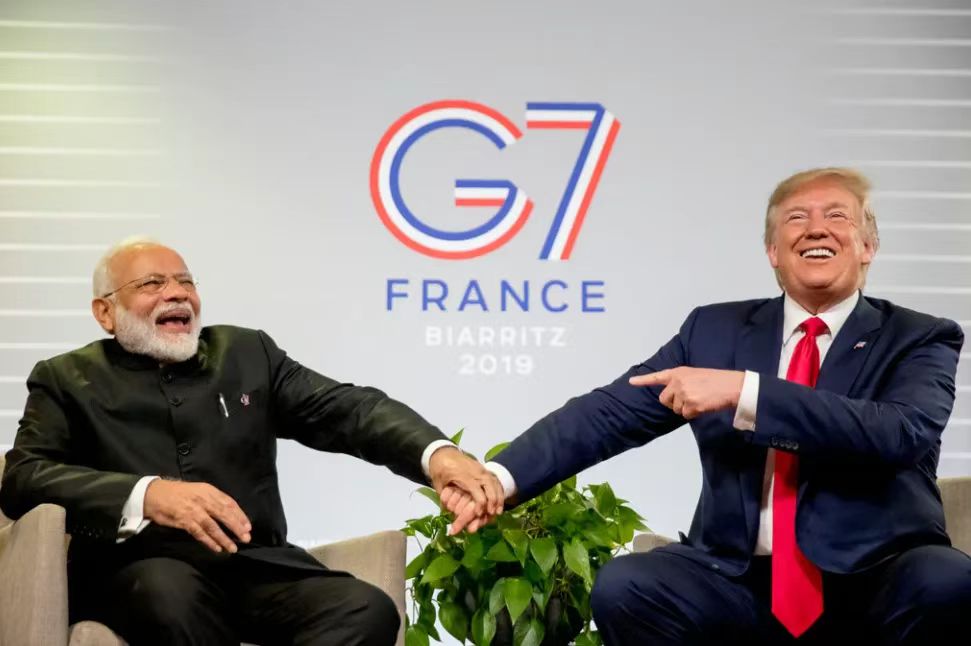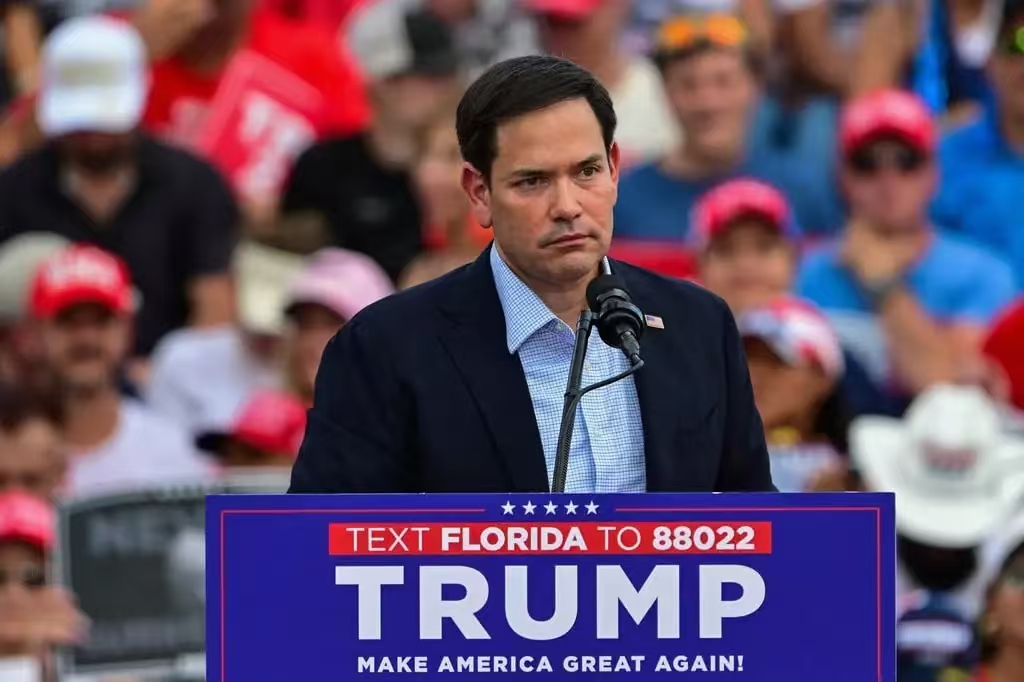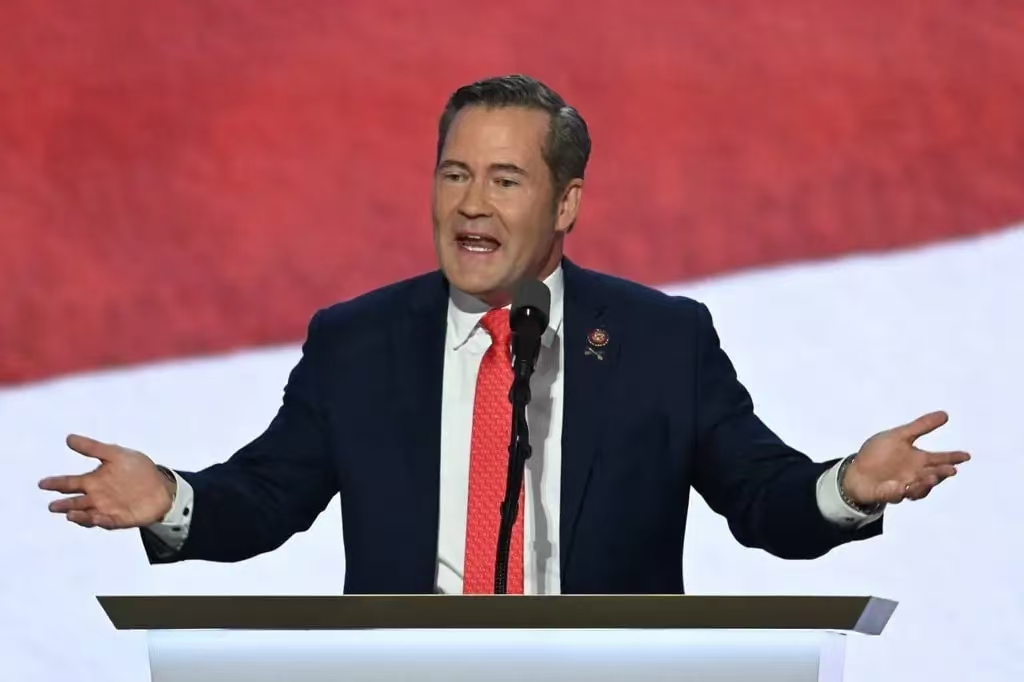Liu Zongyi interviewed by SCMP
Liu Zongyi source:SCMP
source:SCMP
Days after Donald Trump’s electoral win sent shock waves of concern through Europe and Asia, India’s top diplomat seemed to mock the response, expressing confidence in being able to navigate the US president-elect’s approach to foreign relations.
Indian Foreign Minister Subrahmanyam Jaishankar said that many countries might be nervous, but that “India was not one of them”.
Prime Minister Narendra Modi’s congratulations, Jaishankar said, were “among the first three calls, I think, that President Trump took”.
Indian Prime Minister Narendra Modi and then-President Donald Trump share a laugh during the G-7 summit in Biarritz, France on August 26, 2019. Photo: AP Several of the nominees Trump announced last week–Senator Marco Rubio for US secretary of state, Representative Mike Waltz for national security adviser, and former representative Tulsi Gabbard for director of national intelligence–have staunchly supported stronger relations with India as part of the US strategy to counter China in the Indo-Pacific. While some analysts argued that Trump’s “America First”policy may impede deeper cooperation in tech and trade with India, others contended that India is likely to have a better chance at striking a favourable deal with Trump than China. Either way, the new team is likely to shift the US strategic focus, placing less emphasis on human rights and India’s relationship with Russia. Under outgoing President Joe Biden, the US worked to strengthen ties with New Delhi as a counterbalance to China, while pressing Modi on his civil liberties record. The new approach may prioritise other concerns, altering that balance. “It turns out that the overall mix is very favourable to India,”said Sarang Shidore, director of the Global South programme at the Quincy Institute in Washington, citing the more pro-India and anti-China stance voiced by several of Trump’s cabinet nominees. In July, Rubio introduced the US-India Defence Cooperation Act, legislation intended to elevate India’s strategic status and grant it access to advanced US military technology, on par with close allies such as Japan, Israel, South Korea and Nato partners. “Communist China continues to aggressively expand its domain in the Indo-Pacific region, all while it seeks to impede the sovereignty and autonomy of our regional partners,” Rubio said in a statement announcing the bill.
US Senator Marco Rubio at a campaign rally for Donald Trump in Doral, Florida, on July 9. Photo: AFP/Getty Images/TNS In September, China and India announced a consensus on disengaging their troops in their long-standing Himalayan border dispute, which led to deadly clashes in 2021. The deal helped clear the way for the first formal meeting between Chinese president Xi Jinping and Modi in four years. Rubio voiced support for India in 2014, shortly after Modi first became prime minister and visited Washington. Rubio criticised then-President Barack Obama for “neglecting” India following efforts by the George W. Bush administration to strengthen ties with New Delhi. “The world’s largest democracy has the potential to become a key US partner in the decades ahead,” the senator said then. Waltz, Trump’s pick for his national security adviser, chairs the House Congressional Caucus on India and Indian-Americans and has long advocated strengthening US defence and security ties with China’s neighbour. He travelled to New Delhi in August 2023 to participate in the country’s Independence Day celebrations with Modi. While there he hailed Modi’s “Make in India” initiative, which aims to position the nation as a promising manufacturing alternative to China, and pledged that the US would work alongside New Delhi. Liu Zongyi, a senior fellow with the Shanghai Institutes for International Studies’ South Asia and China Centre, said that “based on previous positions made by these nominees, it’s not good for China’s ties with the US and with India”. He added that despite the border thaw, “India will continue to see China as a top strategic rival and is unlikely to ease its efforts to compete with China”.
US Representative Michael Waltz, Republican of Florida, speaking during the third day of the 2024 Republican National Convention in Milwaukee, Wisconsin, on July 17. Photo: AFP Washington’s hard stance against Beijing, Robinder Sachdev, an Indian foreign relations analyst, contended, “will not only weaken China’s growing influence, but it will also bring advantage to India”. American companies, he told the Indian news agency ANI, “would now look to move out of China more and more because of the problems they face” as Washington prioritises moving US supply chains away from China. India, Sachdev noted, could be an “attractive destination”. However, Lin Minwang of Fudan University’s Centre for South Asian Studies argued that questions remain about how much Trump, who has repeatedly voiced doubts about security alliances, would work on ties to India–or even whether his aides could convince him to do so. Under Trump’s “America First” policy during his first term from 2017 to 2021, the US moved significantly toward isolationism. “If that is still the faith of Trump now, then it will be a question if the US is going to invest more on its own alliances,” Lin said. “How can we expect Trump to invest more on its partnership with India?” Despite optimism about the US-India partnership, Lin cautioned that relations might be more fragile than they appear. The Biden administration has raised concerns over India’s human rights record, and India’s national security adviser, Ajit Doval, canceled a US trip in September after a New York court issued a summons related to a civil suit filed by Sikh separatist Gurpatwant Singh Pannun. While India labels Pannun a terrorist, the US Justice Department indicted an Indian national over a foiled plot to kill him, later adding an Indian intelligence officer to the charges. Moreover, US-India trade relations during Trump’s first term were rocky under US Trade Representative Robert Lighthizer, who initiated trade investigations and imposed tariffs on Indian imports. He also removed New Delhi from a duty-free programme. Lighthizer is reportedly in line for trade representative again, though nothing has been officially announced.





